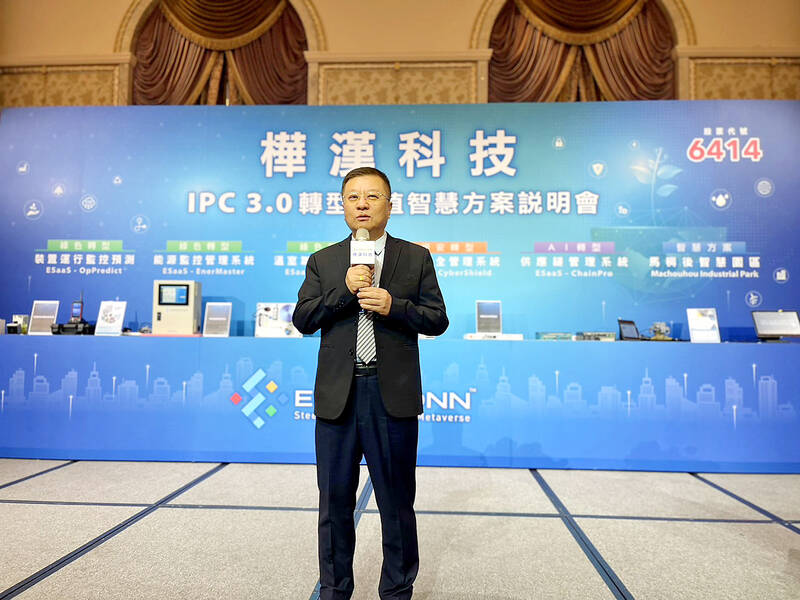Ennoconn Corp (樺漢科技) yesterday reported its best first-quarter financial results in its history and said it remains positive about the second quarter, based on orders and improving inventory turnover.
Ennoconn, an industrial computer subsidiary of Hon Hai Precision Industry Co (鴻海精密), provides hardware solutions for point-of-sale, banking automation, kiosk, lottery and industrial automation systems.
The company attributed last quarter’s growth to improving shipments, as well as the services it provided to major financial retailers and lottery operators in the European and US markets.

Photo courtesy of Ennoconn Corp
Net profit for the January-to-March quarter jumped 56.7 percent year-on-year to NT$492.45 million (US$16.02 million), Ennoconn said, as expanding business scale and better collaboration with its customers helped improve its bottom line.
On a quarterly basis, net profit declined 75.9 percent from NT$2.05 billion.
Earnings per share were NT$4.64, compared with NT$2.98 a year earlier and NT$19.31 the previous quarter, company data showed.
As the company’s three major units — design and manufacturing, systems integration and brand business — maintained steady growth momentum, first-quarter revenue rose 31.5 percent year-on-year to NT$28.49 billion.
The figure rose 14.1 percent from the previous quarter.
In the first quarter, the design and manufacturing segment’s profit jumped 122 percent from a year earlier, while profits generated by the systems integration and brand business segments rose 24.2 percent and 57.1 percent respectively, the company said.
Ennoconn’s revenue last month rose 26.45 percent year-on-year to NT$9.33 billion, bringing cumulative revenue in the first four months to NT$38.07 billion.
The company said its cumulative revenue increased 31.05 percent from the previous year and was its best January-to-April figure ever.
The company said it is upbeat about this year, as it has clear order visibility through the first quarter of next year and has a book-to-bill ratio of about 1.1 percent.
Figures above 1 percent indicate increasing demand.
Ennoconn chairman Steve Chu (朱復銓) yesterday said the company has reached a new milestone for its business transformation from industrial PC to intelligent computing and innovative platform convergence, following five years of horizontal and vertical integration of resources at the company’s subsidiaries and partners.
The company aims to develop business opportunities with partners including MediaTek Inc (聯發科), Google Cloud, Chunghwa Telecom Co (中華電信), Intel Corp and Arm Ltd, it said at an event in Taipei.
Ennoconn is committed to implementing a diversified and multifaceted business model, extending global deployment of multiple supply chains and continuing hardware, and software integration to maintain its competitiveness, despite macroeconomic headwinds, it said.

Nissan Motor Co has agreed to sell its global headquarters in Yokohama for ¥97 billion (US$630 million) to a group sponsored by Taiwanese autoparts maker Minth Group (敏實集團), as the struggling automaker seeks to shore up its financial position. The acquisition is led by a special purchase company managed by KJR Management Ltd, a Japanese real-estate unit of private equity giant KKR & Co, people familiar with the matter said. KJR said it would act as asset manager together with Mizuho Real Estate Management Co. Nissan is undergoing a broad cost-cutting campaign by eliminating jobs and shuttering plants as it grapples

TEMPORARY TRUCE: China has made concessions to ease rare earth trade controls, among others, while Washington holds fire on a 100% tariff on all Chinese goods China is effectively suspending implementation of additional export controls on rare earth metals and terminating investigations targeting US companies in the semiconductor supply chain, the White House announced. The White House on Saturday issued a fact sheet outlining some details of the trade pact agreed to earlier in the week by US President Donald Trump and Chinese President Xi Jinping (習近平) that aimed to ease tensions between the world’s two largest economies. Under the deal, China is to issue general licenses valid for exports of rare earths, gallium, germanium, antimony and graphite “for the benefit of US end users and their suppliers

Dutch chipmaker Nexperia BV’s China unit yesterday said that it had established sufficient inventories of finished goods and works-in-progress, and that its supply chain remained secure and stable after its parent halted wafer supplies. The Dutch company suspended supplies of wafers to its Chinese assembly plant a week ago, calling it “a direct consequence of the local management’s recent failure to comply with the agreed contractual payment terms,” Reuters reported on Friday last week. Its China unit called Nexperia’s suspension “unilateral” and “extremely irresponsible,” adding that the Dutch parent’s claim about contractual payment was “misleading and highly deceptive,” according to a statement

The Chinese government has issued guidance requiring new data center projects that have received any state funds to only use domestically made artificial intelligence (AI) chips, two sources familiar with the matter told Reuters. In recent weeks, Chinese regulatory authorities have ordered such data centers that are less than 30 percent complete to remove all installed foreign chips, or cancel plans to purchase them, while projects in a more advanced stage would be decided on a case-by-case basis, the sources said. The move could represent one of China’s most aggressive steps yet to eliminate foreign technology from its critical infrastructure amid a